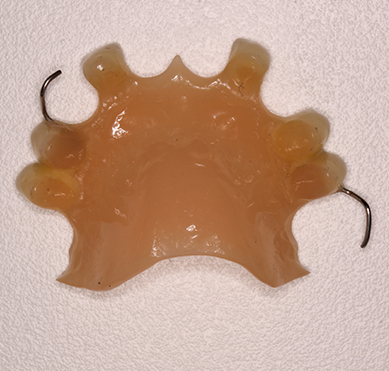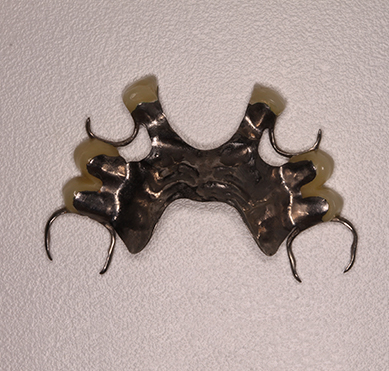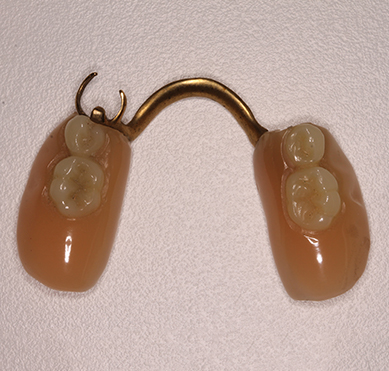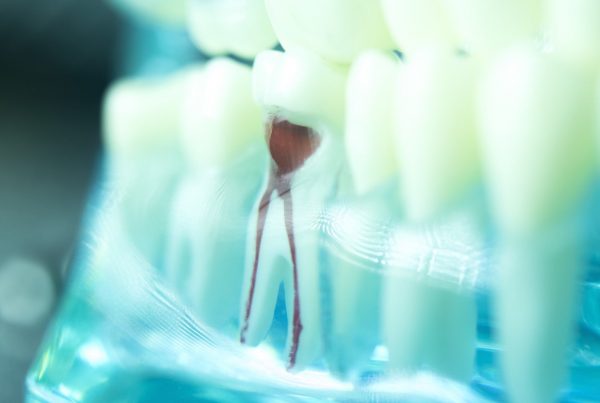A denture is a false tooth or teeth on a plate. They are not fixed in place and can be taken in and out. They are generally the easiest way to replace missing teeth. Dentures are great if there are lots of missing teeth or if you have no teeth at all. However, they may not be the best long term option if you are replacing a single tooth.
The nice thing about any denture is that it doesn’t involve any really invasive treatment. A denture will normally be constructed over several appointments and will involve taking impressions and records of your teeth. From a patient point of view, it doesn’t get simpler.
Update in 2020: We get a lot of people visiting this page wondering whether it is possible to have dentures made online. Although it is technically possible, we believe that this is not a good idea.
There might be some services online where they send you materials to take your own impressions of your mouth. You then send the impressions back and the company makes you some form of appliance. There are plenty of companies making ‘clip-in veneers’ in this way and I’m sure there are people out there who would make you a denture as well.
However, making a denture is a procedure that takes several appointments to do it properly. If you are after a denture which fits well and lasts, you will need to visit a dentist or dental technician. Sorry.
Types of Denture
The plate that supports the teeth can either be made of plastic or metal. The plastic is the less expensive option and is easy to add teeth to in future. It’s a good option if your dentist advises you that you may loose more teeth further down the line. The downside with plastic dentures is that they often stay in place by suction. This means they need to cover more of your mouth and can feel bulky.
Dentures with a metal plate will generally be less bulky than the plastic because metal is stronger so can be made thinner. They can generally be held in with little clasps which means that it doesn’t need to cover a large area to gain suction to stay in place. The downside of a denture with a metal frame is that it will generally put a bit more pressure on the remaining teeth. It will use the remaining teeth for support whereas a plastic plate will use the palate and gums for support. There needs to be enough teeth to support a metal denture and these teeth have to be up to the job. If the remaining teeth are not up to supporting the metal denture, you are better off with a plastic one.
To answer a question that may have sprung to mind, the teeth on any denture will generally be plastic or porcelain and they should look like natural teeth. When I say metal denture, the majority of the metal work should be hidden away out of sight. You may be able to see the odd clasp but the metal part of a metal denture will generally be in your palate or under your tongue.
Drawbacks to Dentures
The biggest downside is that a denture is not fixed in place. Dentures may be able to move during speech or eating. Something like a fixative from a pharmacy or supermarket may help. I prefer the gels to the strips but find out what works for you. If you are really struggling, then you will have to have a chat with your dentist about whether the denture can be improved or swapped for something else.
The other downside of dentures not being fixed in place is that you need to take it in and out at night time. If you keep the dentures in over night, the gums that are covered by the denture will never have a chance to breathe. It’s like when you remove a sticky plaster over a graze. The skin underneath is all soggy because the skin can’t breathe. If you don’t give your gums a chance to recover, you are likely to get fungal infections. The area might become sore or it may just look bright red. It is really important to take your denture out at night.
If you are new to wearing a denture, you will always struggle initially. It’s something new in your mouth and so will take time to get used to. You may find that your speech is affected slightly and you feel it is moving about slightly. If it is new to you, it will always take a bit of time to get used to it. Don’t worry and be patient. You will get better at controlling it with time. It will normally take at least a few days for you to feel comfortable with a new denture.
Immediate dentures
An ‘immediate’ or ‘temporary’ denture is a denture that is fitted straight after a tooth or teeth are extracted. The idea is that the patient doesn’t have any time with a gap. These types of dentures should always be thought of as temporary. Over the next 3 to 6 months after the extraction of a tooth, the gum under the denture will change shape and shrink as it heals. Once healing has finished, you will find that the immediate denture doesn’t fit as well anymore. At this point you may need a new denture or different option to fill the gap.
I know a lot of that information on dentures seems slightly negative. Dentures are not a fixed option so are not generally as appealing as the alternatives. However, they are relatively simple to make and are usually less costly than other options. They are often the best option if lots of teeth are missing.
If you need advice on how to care for a denture, click here.
Keep updated with the Online Dentist newslettersign up today
Recent Articles
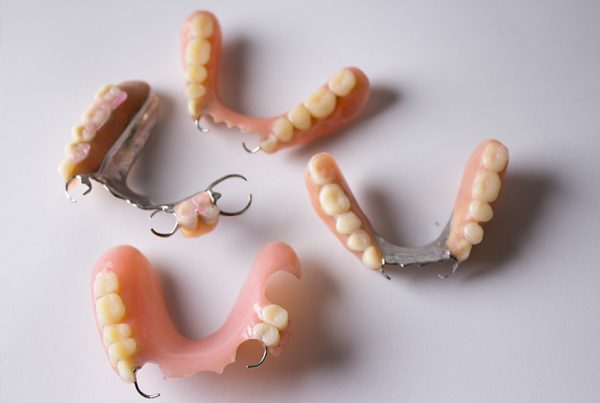 A denture is a false tooth or teeth on a plate. They are not fixed in place and can be taken in and out. They are generally the easiest way...
A denture is a false tooth or teeth on a plate. They are not fixed in place and can be taken in and out. They are generally the easiest way...
 Gum disease is when bacteria have got underneath your gums and are damaging the supporting tissues of your teeth. If you get rid of the bacteria, you’ll stop the damage....
Gum disease is when bacteria have got underneath your gums and are damaging the supporting tissues of your teeth. If you get rid of the bacteria, you’ll stop the damage....


